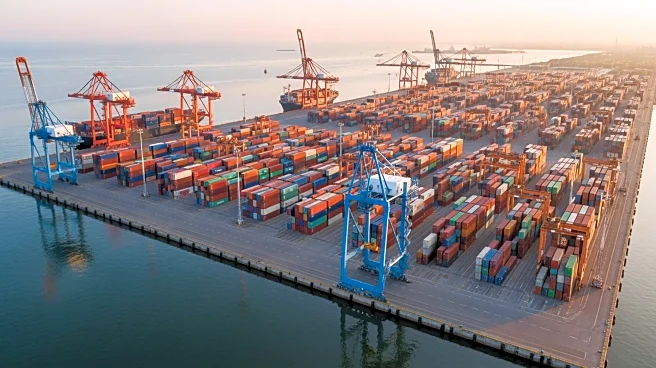What's Happening?
Saudi Global Ports Group (SGP) has inaugurated the Terminal 2 Berth Expansion and broken ground on the Dammam Integrated Logistics Zone at King Abdulaziz Port Dammam. This development aims to enhance Saudi Arabia's logistics capabilities and position
the Kingdom as a global logistics hub. The event was attended by Prince Saud bin Nayef bin Abdulaziz, Governor of the Eastern Province, and Eng. Saleh bin Nasser Al-Jasser, Minister of Transport and Logistic Services, along with senior representatives from Saudi governmental authorities and logistics companies. The Dammam Integrated Logistics Zone, managed by SGP Freezones, spans 1 million square meters and represents an investment of up to SAR 1.3 billion. It will offer modular warehousing, cold chain and vehicle storage facilities, re-export and light manufacturing zones, and dedicated areas for petrochemical products, e-commerce storage, and container handling. The Terminal 2 expansion adds 225 meters to the existing quay length, allowing two mega container vessels to berth simultaneously, increasing the handling capacity to 3.8 million TEUs by 2025.
Why It's Important?
The expansion of the Dammam Integrated Logistics Zone and Terminal 2 is crucial for Saudi Arabia's Vision 2030, which aims to diversify the economy and reduce dependence on oil. By enhancing logistics infrastructure, Saudi Arabia can improve its trade capacity and competitiveness, attracting more international business and investment. This development supports job creation and supply chain resilience, contributing to economic growth. The increased capacity at King Abdulaziz Port Dammam will strengthen its position as a key maritime gateway on the Arabian Gulf, facilitating greater trade flow and connectivity. The initiative reflects Saudi Arabia's commitment to becoming a leading global logistics hub, which is vital for its long-term economic strategy.
What's Next?
As the logistics zone and terminal expansion progress, Saudi Arabia is expected to see increased interest from international logistics companies and shipping lines. The enhanced infrastructure will likely lead to more partnerships and collaborations, further boosting the Kingdom's trade capabilities. The focus will be on integrating sea, land, and industrial logistics to provide comprehensive trade solutions for domestic and international customers. Continued investment in logistics infrastructure will be essential to maintain growth momentum and achieve the goals set out in Vision 2030. Stakeholders will need to monitor the impact of these developments on trade patterns and adjust strategies accordingly.
Beyond the Headlines
The expansion of Saudi Arabia's logistics infrastructure has broader implications for regional trade dynamics. As the Kingdom strengthens its position as a logistics hub, it could influence trade routes and partnerships in the Middle East. The focus on eco-friendly and integrated systems highlights a shift towards sustainable development, aligning with global trends in logistics and trade. This development may also encourage other countries in the region to invest in similar infrastructure projects, fostering greater economic integration and cooperation. The emphasis on modular warehousing and cold chain facilities indicates a growing demand for specialized logistics services, which could drive innovation in the sector.
















